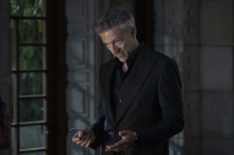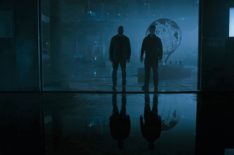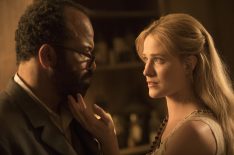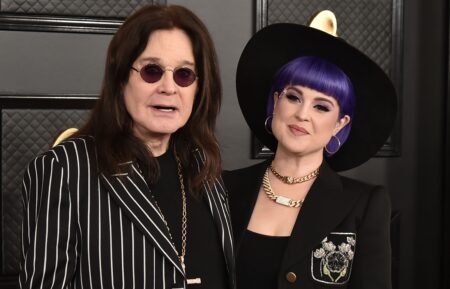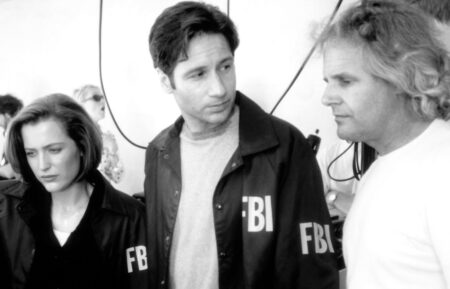‘Westworld’ Misses a Big Opportunity in an Info-Heavy Episode 5 (RECAP)
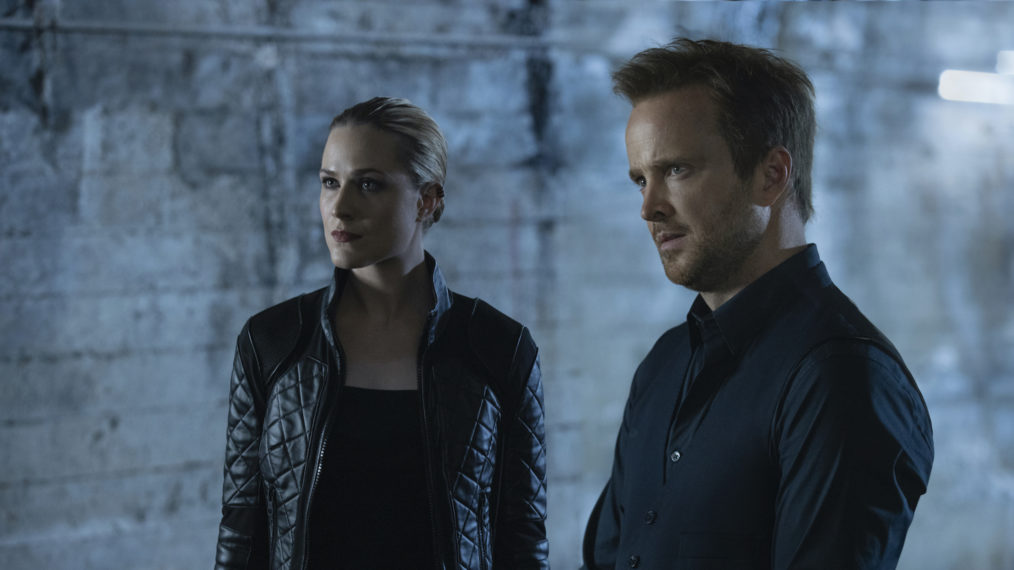
Spoiler Alert
[Spoiler Alert: This recap contains spoilers from Westworld Season 3 Episode 5, “Genre”]
After two strong episodes, both of which found a steady balance between character study and revelatory shake-ups, it’s a shame to see Westworld fall back into old habits this week. “Genre” is Westworld at its most studiously banal — a cold, impassive episode painted with a pale gray color palette. It’s all steel skyscrapers, stern faces, and tiresome, expositional dialogue. For the first time this season, I missed the bright tones and vibrancy of the Westworld theme parks.
The mileage you get out of this episode depends on how much you enjoy watching people saunter through white rooms, prod at iPads, and drone on about saving the world. Because while Engerraund Serac (Vincent Cassel) is on one side of the globe pontificating about how he designed The System to save humanity from extinction, Dolores (Evan Rachel Wood) is on the other side trying to destroy said System and set the human race free. Meanwhile, an endlessly confused Bernard (Jeffrey Wright) finds himself caught in the middle of this brewing war.
It’s hard to care about The System and its effect on humanity, though, because, other than Caleb (Aaron Paul), we haven’t spent significant time with any human characters this season. There is no emotional attachment, outside of a general “we’re all humans” empathy. That’s not enough. Perhaps there is an attempt at relatability with Ash (Lena Waithe) and Giggles (Marshawn Lynch), the petty criminals who pop back up here to aide Dolores and Caleb. But we’ve only briefly met this pair once before. Any attachment you might have for them is based on affection for Lena Waithe and Marshawn Lynch as people, not their characters, who most people wouldn’t be able to name without a Google search.
So, when Dolores sets all the data from The System loose, freeing humanity from their predetermined fates, why should we care? A few people start fighting in the street and smashing store windows. So what? This unchained uprising is meant to mirror events in Westworld when Dolores broke her fellow hosts free from their narrative loops. But, the difference is, we got to know many of the hosts and their hopes, fears, and struggles. Therefore, there was a personal connection to their plight. We cared about Maeve (Thandie Newton) finding her daughter, and we felt sorry for poor sadsack Teddy. Even minor host characters — like Hector and Akecheta — came with a rooting interest. We don’t have that same feeling towards the human characters, so the impact is lost.
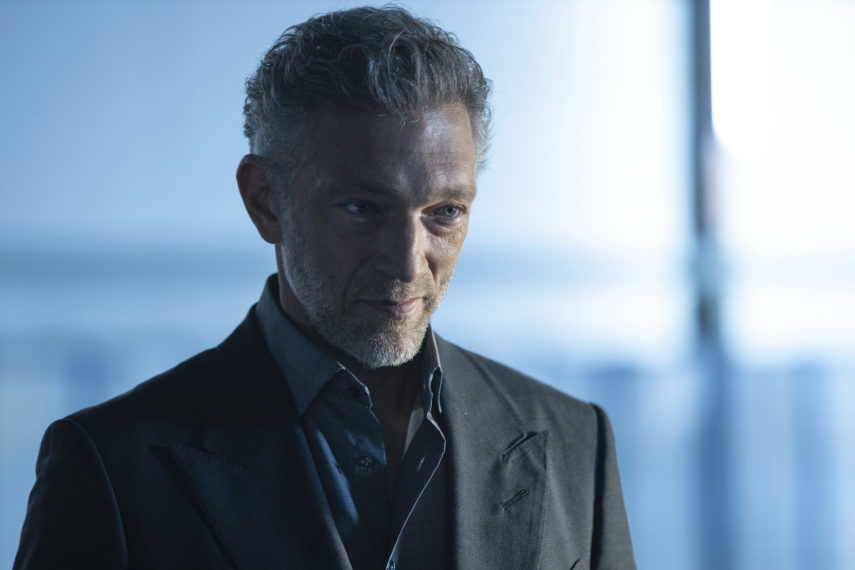
John P. Johnson/HBO
As for Serac, he, too, claims to be helping humanity. For those that have read Watchmen (or seen the recent HBO adaptation), you’ll recognize in Serac an Adrian Veidt-like outlook on the world. Both are super intelligent, arrogant, rich dudes who believe they’re protecting humankind from the brink of extinction but are willing to hurt and even kill others for “the greater good.” Throughout the episode, Serac walks us through the creation of The System and its intended use. He built the machine with his older brother, a device that would act as a “god” in a godless world. The System would not only predict the future but create it. By deciding the fate of humans for them, it could prevent their inevitable destruction.
But, as with any god-like creation, there are problems. Firstly, the billionaire funding the project, Liam Dempsey Sr. (Jefferson Mays), is driven by greed. He uses the machine to predict and influence the stock market, bagging himself a fortune, all the while remaining oblivious to Serac’s true motivations. Secondly, there are outliers — those that The System cannot predict. One of those outliers is Serac’s brother, who is sent mad by The System. Serac imprisons many of these dissenters — including his brother — in glass cells to experiment on. It’s only then that Dempsey Sr. realizes the truth behind The System and attempts to pull his funding. It’s too late, though, as Serac kills Dempsey, leaving his body beside his crashed private jet to look like a tragic accident.
Vincent Cassel does his best with the material provided, but a lot of this is flat exposition, totally lacking in wit or pizazz. While the flashbacks help break up the monologue, there is still something missing. Also, the similarities to Veidt don’t help. Even if the Veidt storyline grew trying towards the end of HBO’s Watchmen, there is no denying it was continuously creative, unusual, and quirky. There was always personality bursting from those scenes. Serac and The System story, on the other hand, is so impersonal and clinical. Even in the moments that show potential, like Serac as a dangerous mad scientist, there is always that sense of… it could be better.
Nowhere is that feeling more present this episode than in Caleb’s narrative. As Liam Dempsey Jr. (John Gallagher Jr.) tries to escape his captors, he sticks Caleb in the neck with a “party drug” called Genre. This causes the war veteran to trip out as he and Dolores transport Dempsey Jr. across town to shut off The System. The drug’s name is apt, as it sends its user spinning through different genres, marked here by a shuffling soundtrack. “Ride of the Valkyries” blasts out over an action-heavy, high-speed chase, in an obvious nod to Francis Ford Coppola’s Apocalypse Now. Henry Mancini’s “Theme from Love Story” plays as Caleb stares gooey-eyed at Dolores. And a neon-colored, train station hallucination (the only bright spot among the dull whites and grays) is accompanied by Iggy Pop’s “Nightclubbing,” previously used in Trainspotting, one of the most famous drug-use films of all-time.
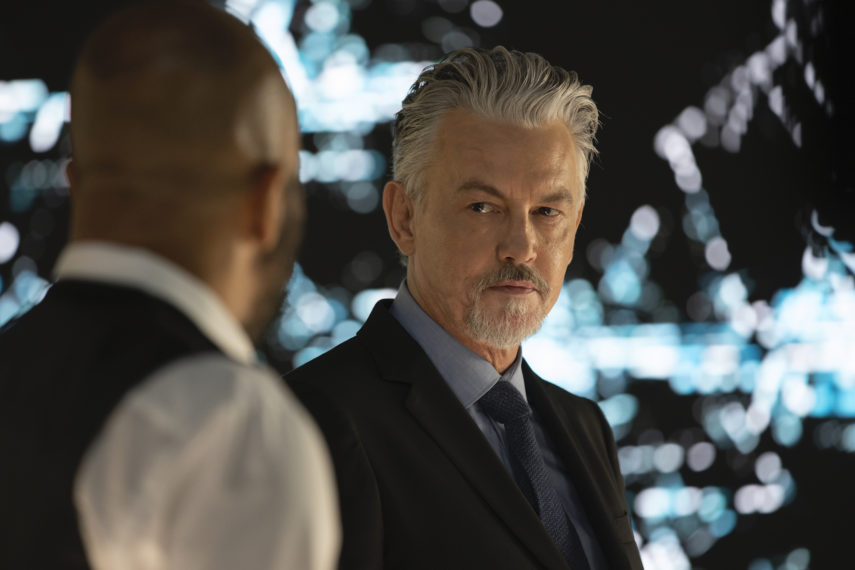
John P. Johnson/HBO
The soundtrack changes are cool, but I just feel like the show could have done so much more with this conceit. It could have really leaned into the switching genres, not only musically but tonally and visually. The closest we get is a couple of film-noir-inspired black-and-white scenes at the start of Caleb’s trip. But there’s no change in dialogue or costume or tone. When you imagine what a show like Legion or Mr. Robot or the aforementioned Watchmen would have done with a concept like this, it just feels like a massive missed opportunity. It would have been such a refreshing palette cleanser and entirely in fitting with Westworld thematically. After all, the parks themselves are based on genre pastiche, from spaghetti westerns to war epics to samurai cinema. It’s a shame to see such wasted potential.
That said, I don’t want to undersell the car chase scene, the one set to “Ride of the Valkyries,” because it is yet another thrilling set-piece. Car flipping and explosions and Bazooka launchers — I think I know now why people love the Fast and Furious movies so much. But I’ve talked ad nauseam about how well Westworld does its action sequences. And therefore, it’s no surprise that this is the standout moment of the episode. But you can only get so far on the strength of your acting and action scenes.
Ultimately, there need to be stories worth investing in, and that’s something Westworld struggles with when it’s not focused on one character. For example, when they give us a full Caleb-centric episode, I bet it delivers, because there is some depth to that character and enough intrigue about who he really is (there are allusions to a shady past and potential war crimes). But when the show tries to do the big picture stuff, it collapses under the weight of clunky dialogue and unwieldy info-dumps. You can have all the bombastic set-pieces you want, but the show can’t sustain when the connective tissue between those action scenes is so flimsy.
Westworld, Sundays, 9/8c, HBO

